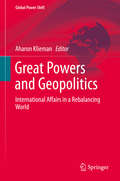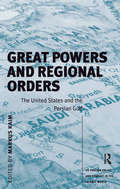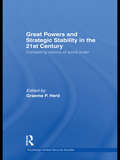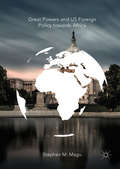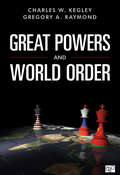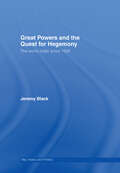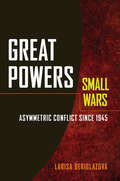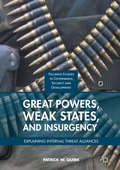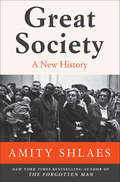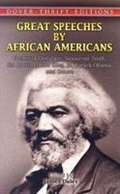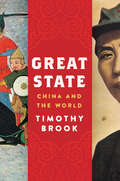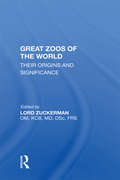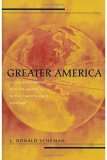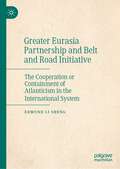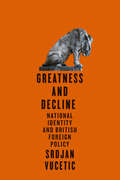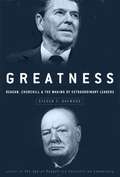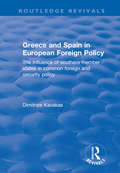- Table View
- List View
Great Powers and Geopolitics
by Aharon KliemanThis book presents the theoretical-historical-comparative political framework needed to fully grasp the truly dynamic nature of 21st century global affairs. The author provides a realistic assessment of the shift from U. S predominance to a new mix of counterbalancing rival middle-tier and assertive regional powers, while highlighting those geopolitical zones of contention most critical for future international stability. The book will appeal to scholars and policy makers interested in understanding the contours of the emerging world order, and in identifying its principal shapers and leading political actors.
Great Powers and International Hierarchy
by Daniel McCormackHierarchical relationships—rules that structure both international and domestic politics—are pervasive. Yet we know little about how these relationships are constructed, maintained, and dismantled. This book fills this lacuna through a two-pronged research approach: first, it discusses how great power negotiations over international political settlements both respond to domestic politics within weak states and structure the specific forms that hierarchy takes. Second, it deduces three sets of hypotheses about hierarchy maintenance, construction, and collapse during the post-war era. By offering a coherent theoretical model of hierarchical politics within weaker states, the author is able to answer a number of important questions, including: Why does the United States often ally with autocratic states even though its most enduring relationships are with democracies? Why do autocratic hierarchical relationships require interstate coercion? Why do some hierarchies end violently and others peacefully? Why does hierarchical competition sometimes lead to interstate conflict and sometimes to civil conflict?
Great Powers and Regional Orders: The United States and the Persian Gulf (US Foreign Policy and Conflict in the Islamic World)
by Markus KaimGreat Powers and Regional Orders explores the manifestations of US power in the Persian Gulf and the limits of American influence. Significantly, this volume explores both the impact of US domestic politics and the role played by the region itself in terms of regional policy, order and stability. Well organized and logically structured, Markus Kaim and contributors have produced a new and unique contribution to the field that is applicable not only to US policy in the Persian Gulf but also to many other regional contexts. This will interest anyone working or researching within foreign policy, US and Middle Eastern politics.
Great Powers and Strategic Stability in the 21st Century: Competing Visions of World Order (Routledge Global Security Studies)
by Graeme P. HerdThis book addresses the issue of grand strategic stability in the 21st century, and examines the role of the key centres of global power - US, EU, Russia, China and India - in managing contemporary strategic threats. This edited volume examines the cooperative and conflictual capacity of Great Powers to manage increasingly interconnected strategic threats (not least, terrorism and political extremism, WMD proliferation, fragile states, regional crises and conflict and the energy-climate nexus) in the 21st century. The contributors question whether global order will increasingly be characterised by a predictable interdependent one-world system, as strategic threats create interest-based incentives and functional benefits. The work moves on to argue that the operational concept of world order is a Concert of Great Powers directing a new institutional order, norms and regimes whose combination is strategic-threat specific, regionally sensitive, loosely organised, and inclusive of major states (not least Brazil, Turkey, South Africa and Indonesia). Leadership can be singular, collective or coalition-based and this will characterise the nature of strategic stability and world order in the 21st century. This book will be of much interest to students of international security, grand strategy, foreign policy and IR. Graeme P. Herd is Co-Director of the International Training Course in Security Policy at the Geneva Centre for Security Policy (GCSP). He is co-author of several books and co-editor of The Ideological War on Terror: World Wide Strategies for Counter Terrorism (2007), Soft Security Threats and European Security (2005), Security Dynamics of the former Soviet Bloc (2003) and Russia and the Regions: Strength through Weakness (2003).
Great Powers and US Foreign Policy towards Africa
by Stephen M. MaguThis book addresses one main question: whether the United States has a cohesive foreign policy for Africa. In assessing the history of the United States and its interactions with the continent, particularly with the Horn of Africa, the author casts doubt on whether successive US administrations had a cohesive foreign policy for Africa. The volume examines the historical interactions between the US and the continent, evaluates the US involvement in Africa through foreign policy lenses, and compares foreign policy preferences and strategies of other European, EU and BRIC countries towards Africa.
Great Powers and World Order: Patterns and Prospects
by Charles W. Kegley Gregory A. RaymondGreat Powers and World Order encourages critical thinking about the nature of world order by presenting the historical information and theoretical concepts needed to make projections about the global future. Charles W. Kegley and Gregory Raymond ask students to compare retrospective cases and formulate their own hypotheses about not only the causes of war, but also the consequences of peace settlements. Historical case studies open a window to see what strategies for constructing world order were tried before, why one course of action was chosen over another, and how things turned out. By moving back and forth in each case study between history and theory, rather than treating them as separate topics, the authors hope to situate the assumptions, causal claims, and policy prescriptions of different schools of thought within the temporal domains in which they took root, giving the reader a better sense of why policy makers embraced a particular view of world order instead of an alternative vision.
Great Powers and World Order: Patterns and Prospects
by Charles W. Kegley Gregory A. RaymondGreat Powers and World Order encourages critical thinking about the nature of world order by presenting the historical information and theoretical concepts needed to make projections about the global future. Charles W. Kegley and Gregory Raymond ask students to compare retrospective cases and formulate their own hypotheses about not only the causes of war, but also the consequences of peace settlements. Historical case studies open a window to see what strategies for constructing world order were tried before, why one course of action was chosen over another, and how things turned out. By moving back and forth in each case study between history and theory, rather than treating them as separate topics, the authors hope to situate the assumptions, causal claims, and policy prescriptions of different schools of thought within the temporal domains in which they took root, giving the reader a better sense of why policy makers embraced a particular view of world order instead of an alternative vision.
Great Powers and the Quest for Hegemony: The World Order since 1500 (War, History And Politics Ser.)
by Jeremy BlackThis timely book provides a general overview of Great Power politics and world order from 1500 to the present. Jeremy Black provides several historical case-studies, each of which throws light on both the power in question and the international system of the period, and how it had developed from the preceding period. The point of departure for this
Great Powers, Small Wars: Asymmetric Conflict since 1945
by Larisa DeriglazovaA sophisticated appraisal of the problem of asymmetric conflict in the post–World War II period.In a sophisticated combination of quantitative research and two in-depth case studies, Larisa Deriglazova surveys armed conflicts post World War II in which one power is much stronger than the other. She then focuses on the experiences of British decolonization after World War II and the United States in the 2003 Iraq war. Great Powers, Small Wars employs several large databases to identify basic characteristics and variables of wars between enemies of disproportionate power. Case studies examine the economics, domestic politics, and international factors that ultimately shaped military events more than military capacity and strategy.
Great Powers, Weak States, and Insurgency
by Patrick W. QuirkThis book offers an original and theoretically rich examination into the dynamics of alliances that great powers and weak states form to defeat threats, such as rebellion or insurgency, within the smaller state's borders. The author examines contemporary examples of such "internal threat alliances," including Russia's collaboration with Syria's Assad regime to defeat anti-government rebels and U. S. cooperation with Afghanistan's ruling political elite to combat the Taliban. In each case, the weaker state's leadership wanted to remain in power while the great power sought to safeguard its interests linked to the regime's stability. The book adds to International Relations (IR) theory by presenting a distinct conceptual framework that explains why internal threat alliances form, why some are more cohesive than others, and why some are effective while others are not. It thus promises to be of interest to IR scholars and students working in the areas of security studies, alliance dynamics, political violence, and civil war, but also to policy-makers grappling with how to salvage interests, such as access to natural resources or regional stability, imperiled by violence in weak states.
Great Society: A New History
by Amity ShlaesThe New York Times bestselling author of The Forgotten Man and Coolidge offers a stunning revision of our last great period of idealism, the 1960s, with burning relevance for our contemporary challenges."Great Society is accurate history that reads like a novel, covering the high hopes and catastrophic missteps of our well-meaning leaders." —Alan GreenspanToday, a battle rages in our country. Many Americans are attracted to socialism and economic redistribution while opponents of those ideas argue for purer capitalism. In the 1960s, Americans sought the same goals many seek now: an end to poverty, higher standards of living for the middle class, a better environment and more access to health care and education. Then, too, we debated socialism and capitalism, public sector reform versus private sector advancement. Time and again, whether under John F. Kennedy, Lyndon Johnson, or Richard Nixon, the country chose the public sector. Yet the targets of our idealism proved elusive. What’s more, Johnson’s and Nixon’s programs shackled millions of families in permanent government dependence. Ironically, Shlaes argues, the costs of entitlement commitments made a half century ago preclude the very reforms that Americans will need in coming decades.In Great Society, Shlaes offers a powerful companion to her legendary history of the 1930s, The Forgotten Man, and shows that in fact there was scant difference between two presidents we consider opposites: Johnson and Nixon. Just as technocratic military planning by “the Best and the Brightest” made failure in Vietnam inevitable, so planning by a team of the domestic best and brightest guaranteed fiasco at home. At once history and biography, Great Society sketches moving portraits of the characters in this transformative period, from U.S. Presidents to the visionary UAW leader Walter Reuther, the founders of Intel, and Federal Reserve chairmen William McChesney Martin and Arthur Burns. Great Society casts new light on other figures too, from Ronald Reagan, then governor of California, to the socialist Michael Harrington and the protest movement leader Tom Hayden. Drawing on her classic economic expertise and deep historical knowledge, Shlaes upends the traditional narrative of the era, providing a damning indictment of the consequences of thoughtless idealism with striking relevance for today. Great Society captures a dramatic contest with lessons both dark and bright for our own time.
Great Speeches by African Americans: Frederick Douglass, Sojourner Truth, Dr. Martin Luther King, Jr. , Barack Obama, and Others
by James DaleyThis anthology comprises speeches by influential figures in the history of African-American culture and politics. Contents include the famous "Ain't I a Woman?" speech by Sojourner Truth, Frederick Douglass' immortal "What, to the Slave, Is the Fourth of July?" Martin Luther King, Jr.'s "I Have a Dream," Barack Obama's "Knox College Commencement Address," and many others.
Great Spies of the 20th Century
by Patrick PesnotHeroes to some, traitors to others, spies and intelligence officers continue to fascinate and enthral us with their abilities to operate secretly in the shadows. With these mini-biographies of twenty agents of various nationalities (including members of the DGSE, KGB, CIA, MI6 and Mossad), Patrick Pesnot and 'Mr X' bring the reader as close as possible into the world of espionage, though a panorama of intelligence history.Among the best known of these agents, the reader will find Aldrich Ames, an American accused of spying for the KGB; Eli Cohen, the Israeli spy best known for his espionage work in Syria and Klaus Fuchs, the German-born British agent who helped the USSR to manufacture its atomic bomb in 1949.
Great State: China and the World
by Timothy BrookThe world-renowned scholar and author of Vermeer’s Hat does for China what Mary Beard did for Rome in SPQR: Timothy Brook analyzes the last eight centuries of China’s relationship with the world in this magnificent history that brings together accounts from civil servants, horse traders, spiritual leaders, explorers, pirates, emperors, migrant workers, invaders, visionaries, and traitors—creating a multifaceted portrait of this highly misunderstood nation.China is one of the oldest states in the world. It achieved its approximate current borders with the Ascendancy of the Yuan dynasty in the thirteenth century, and despite the passing of one Imperial dynasty to the next, has maintained them for the eight centuries since. China remained China through the Ming, the Qing, the Republic, the Occupation, and Communism. But despite the desires of some of the most powerful people in the Great State through the ages, China has never been alone in the world. It has had to contend with invaders as well as foreign traders and imperialists. Its rulers for the majority of the last eight centuries have not been Chinese.China became a mega-state not by conquering others, Timothy Brook contends, but rather by being conquered by others and then claiming right of succession to the empires of those Great States. What the Mongols and Manchu ruling families wrought, the Chinese ruling families of the Ming, the Republic, and the People’s Republic, have perpetuated. Yet a contemporary Chinese idea of a ‘fatherland’ that is, and always has been, completely and naturally Chinese persists. Brook argues that China, like everywhere, is the outcome of history, and like every state, rests on its capacities to conquer and suppress.In The Great State, Brook examines China’s relationship with the world at large for the first time, from the Yuan through to the present, by following the stories of ordinary and extraordinary people navigating the spaces where China met, and continues to meet, the world. The Great State includes black-and-white photos throughout.
Great Transformations
by Mark BlythThis book picks up where Karl Polanyi's study of economic and political change left off. Building upon Polanyi's conception of the double movement, Blyth analyzes the two periods of deep seated institutional change that characterized the twentieth century: the 1930s and the 1970s. Blyth views both sets of changes as part of the same dynamic. In the 1930s labor reacted against the exigencies of the market and demanded state action to mitigate the market's effects by 'embedding liberalism. ' In the 1970s, those who benefited least from such 'embedding' institutions, namely business, reacted against these constraints and sought to overturn that institutional order. Blyth demonstrates the critical role economic ideas played in making institutional change possible. Great Transformations rethinks the relationship between uncertainty, ideas, and interests, achieving profound new insights on how, and under what conditions, institutional change takes place.
Great Zoos Of The World: Their Origins And Significance
by Lord ZuckermanThis book illustrates how some best zoos in the world have evolved, by reference to the history of a few. It contains a list of names of the present and former professional staff of the Zoological Society of London.
Greater America: A New Partnership in the Americas in the 21st Century
by L. Ronald SchemanCan democracy develop in Latin America without United States assistance? Why should the United States care? Why is Latin America relevant to U.S. economic growth in global competition? In Greater America: A New Partnership for the Americas in the 21st Century L. Ronald Scheman argues that our future lies not in Europe, Asia, or the Middle East but right here in our own backyard—the Western Hemisphere. He shows how the political and cultural legacy of colonization, immigration, assimilation and pluralism binds North, Central and South America, and how the trends in market growth and resources make the Americas a rich prize in global trade. Despite the tendency of many northerners to underestimate our ties, we are closer to our southern cousins than to any other societies. That relationship will be increasingly stronger given the growing and irrepressible influence of Latino and Caribbean populations in the U.S. For Latin America, the linkage to the U.S. is essential for attracting investment and creating the jobs necessary to overcome its oppressive heritage of poverty and to provide opportunity for a young population that will increasingly expect a better standard of living. Most important, Greater America demonstrates how closer ties with Latin America will help build a stronger U.S. economy while reducing illegal immigration and drug trafficking. He argues that only a NATO-like coalition in the Americas will defeat the drug traffickers, and that a major program to build infrastructure is essential to make trade agreements work. This book celebrates the contribution of the Americas as one of the more important factors in the spread of human freedom in the last half millennium. It makes the case for the unlimited potential of the Americas and shows how it can be unleashed through greater political and economic integration.
Greater China's Olympic Medal Haul: Beyond Sports Excellence (Routledge Contemporary China Series)
by Marcus P. ChuBetween 1984 and 2021, elite athletes from the member regions of Greater China – China, Taiwan, and Hong Kong – competed at each of the ten Summer Olympics. By winning 263 gold medals, 199 silver, and 173 bronze, China became a global sports superpower. Taiwan and Hong Kong pocketed 7 gold medals, 10 silver, and 17 bronze and 2 gold medals, 3 silver, and 4 bronze, respectively, displaying their world-leading statuses in archery, badminton, baseball, cycling, fencing, gymnastics, Judo, karate, sailing, Taekwondo, table tennis, and weightlifting. In response, the leaders of the three regions delivered high-profile praise. Their administrations awarded cash, badges, and/or honorary titles to the medalists. By reviewing journalistic reports, key-players’ memoirs, official documents, and scholarly works, this book aims to understand the significance of the Olympic medal haul to the Chinese, Taiwanese, and Hong Kong authorities. Its findings detail the context in which the Olympic medal haul was leveraged for the political change of the three regions and their relations with each other. They also reveal that the praise and rewards bestowed by the respective authorities on the medalists not only celebrated their jurisdictions’ sporting excellence, but served broader strategic goals across domestic politics and international relations.
Greater Eurasia Partnership and Belt and Road Initiative: The Cooperation or Containment of Atlanticism in the International System
by Edmund Li ShengIn this book, Eurasia will be discussed in the context of the Greater Eurasian Partnership proposed by Russia, the “eastward” transformations spurred by Neo-Eurasianism and the Greater Eurasian Partnership, and cooperation with China through the BRI, while related countries of Atlanticism was used to described the U.S., Europe, and their allies. The Greater Eurasian Partnership proposed by Russia is an initiative with specific diplomatic considerations, economic development strategies, and geopolitical implications. The initiative represents an attempt by Russia to shift foreign policy thinking, which has traditionally focused on alignment with the U.S. and the West. The Greater Eurasian Partnership contains both short-term strategies to cope with Western pressure and long-term strategic goals for building a new international and regional order. What this portends for the future of Sino-Russian relations is of interest to geopoliticians, economists and journalists.
Greater Portland: Urban Life and Landscape in the Pacific Northwest
by Carl AbbottSelected by Choice magazine as an Outstanding Academic Title for 2001<P><P> It has been called one of the nation's most livable regions, ranked among the best managed cities in America, hailed as a top spot to work, and favored as a great place to do business, enjoy the arts, pursue outdoor recreation, and make one's home. Indeed, years of cooperative urban planning between developers and those interested in ecology and habitability have transformed Portland from a provincial western city into an exemplary American metropolis. Its thriving downtown, its strong neighborhoods, and its pioneering efforts at local management have brought a steady procession of journalists, scholars, and civic leaders to investigate the "Portland style" that values dialogue and consensus, treats politics as a civic duty, and assumes that it is possible to work toward public good.Probing behind the press clippings, acclaimed urban historian Carl Abbott examines the character of contemporary Portland--its people, politics, and public life--and the region's history and geography in order to discover how Portland has achieved its reputation as one of the most progressive and livable cities in the United States and to determine whether typical pressures of urban growth are pushing Portland back toward the national norm.In Greater Portland, Abbott argues that the city cannot be understood without reference to its place. Its rivers, hills, and broader regional setting have shaped the economy and the cityscape. Portlanders are Oregonians, Northwesteners, Cascadians; they value their city as much for where it is as for what it is, and this powerful sense of place nurtures a distinctive civic culture. Tracing the ways in which Portlanders have talked and thought about their city, Abbott reveals the tensions between their diverse visions of the future and plans for development.Most citizens of Portland desire a balance between continuity and change, one that supports urban progress but actively monitors its effects on the region's expansive green space and on the community's culture. This strong civic participation in city planning and politics is what gives greater Portland its unique character, a positive setting for class integration, neighborhood revitalization, and civic values. The result, Abbott confirms, is a region whose unique initiatives remain a model of American urban planning.
Greatness and Decline: National Identity and British Foreign Policy (McGill-Queen's Transatlantic Studies)
by Srdjan VuceticExceptionalist ideas have long influenced British foreign policy. As Britain begins to confront the challenges of a post-Brexit era in an increasingly unstable world, a re-examination of the nature and causes of this exceptionalist bent is in order.Arguing that Britain's search for greatness in world affairs was, and still is, a matter of habit, Srdjan Vucetic takes a closer look at the period between Clement Attlee's "New Jerusalem" and Tony Blair's New Labour. Britain's tenacious pursuit of global power was never just a function of consensus among policymakers or even political elites more broadly. Rather, it developed from popular, everyday, and gradually evolving ideas about identity circulating within British – and, more specifically, English – society as a whole. To uncover these ideas, Vucetic works with a unique archive of political speeches, newspapers, history textbooks, novels, and movies across colonial, Cold War, and post–Cold War periods.Greatness and Decline sheds new light on Britain's interactions with the rest of the world while demonstrating new possibilities for constructivist foreign policy analysis.
Greatness: Reagan, Churchill, and the Making of Extraordinary Leaders
by Steven HaywardThe incredible unexplored connections between two of history’s greatest leaders Ronald Reagan and Winston Churchill were true giants of the twentieth century, but somehow historians have failed to notice the many similarities between these extraordinary leaders. Until now. In Greatness, Steven F. Hayward—who has written acclaimed studies of both Reagan and Churchill—goes beneath the superficial differences to uncover the remarkable (and remarkably important) parallels between the two statesmen. In exploring these connections, Hayward shines a light on the nature of political genius and the timeless aspects of statesmanship—critical lessons in this or any age. A swift-moving and original book, Greatness reveals: • The striking similarities between Reagan’s and Churchill’s political philosophies: the two were of the same mind on national defense, the economy, and many other critical issues • What made both Reagan and Churchill so effective in the public arena—including their shared gift for clearly communicating their messages to the people • The connecting thread of the Cold War, which was bookended by Churchill’s “Iron Curtain” address of 1946 and Reagan’s “Tear Down This Wall” speech of 1987 • The odd coincidences that mark everything from their childhoods to their shifts from Left to Right to their shared sense of personal and national destiny Ultimately, Hayward shows, the examples of Churchill and Reagan teach us what is most decisive about political leadership at the highest level—namely, character, insight, imagination, and will. Greatness also serves as a sharp rebuke to contemporary historians who dismiss notions of greatness and the power of individuals to shape history. Hayward demonstrates that the British historian Geoffrey Elton had it right when he wrote, “When I meet a historian who cannot think that there have been great men, great men moreover in politics, I feel myself in the presence of a bad historian. ” From the Hardcover edition.
Greece
by Michael Mitsopoulus Theodore PelagidisTwo Greek economic analysts explain the Greek financial crisis--from beginning to end. The first section of Greece: From Exit to Recovery? explores the lead up to to Greece's adoption of the euro. Authors Theodore Pelagidis and Michael Mitsopoulos believe that the ensuing challenges were foreseeable. In fact, the authors posit that it was Greece's difficultly in dealing with those challenges that sparked the euro crisis.Section II analyzes discrete sectors of the economy, paying special attention to labor and finance--and the mistakes creditors made in focusing on reducing Greek incomes--rather than increasing competitiveness on non-labor costs.Section III investigates why Greek companies spend relatively little on research and development.? The authors' analysis indicates that policy decisions largely determine R&D performance in the private sector, and they advance a number of specific policy proposals to improve the situation.
Greece
by Michael Mitsopoulus Theodore PelagidisTwo Greek economic analysts explain the Greek financial crisis-from beginning to end.The first section of Greece: From Exit to Recovery? explores the lead up to to Greece's adoption of the euro. Authors Theodore Pelagidis and Michael Mitsopoulos believe that the ensuing challenges were foreseeable. In fact, the authors posit that it was Greece's difficultly in dealing with those challenges that sparked the euro crisis.Section II analyzes discrete sectors of the economy, paying special attention to labor and finance-and the mistakes creditors made in focusing on reducing Greek incomes-rather than increasing competitiveness on non-labor costs.Section III investigates why Greek companies spend relatively little on research and development.? The authors' analysis indicates that policy decisions largely determine R&D performance in the private sector, and they advance a number of specific policy proposals to improve the situation.
Greece and Spain in European Foreign Policy: The Influence of Southern Member States in Common Foreign and Security Policy (Routledge Revivals Ser.)
by Dimitrios KavakasThis title was first published in 2001: This in-depth analysis of the foreign policy behaviour of Greece and Spain, draws conclusions on the role and influence that the two southern member states have had at different times. Dimitrios Kavakas concentrates on four aspects: the history; adaptation of domestic structures; patterns of behaviour in participation of the Common Foreign Security Policy (CFSP); and the issue of securitization. Allowing the reader to explore other aspects apart from the study of foreign policy of European Union member states, this invaluable work will find an audience among research and masters students as well as undergraduates. It is also suitable for courses of European foreign policy, comparative policy analysis and specialist courses on politics, international relations and European studies.
